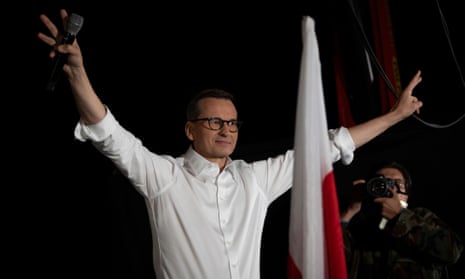Small parties steal the show at Polish debate
“Neither of the two big headliners of yesterday’s blatantly biased debate – prime minister Mateusz Morawiecki from PiS and Civic Coalition leader Donald Tusk – performed well,” Jakub Jaraczewski, a research coordinator at Democracy Reporting International, told the Guardian this morning.
“It was the politicians from three smaller committees vying for the third place in the elections that stole the show: Szymon Hołownia, the co-leader of the centrist-agrarian coalition Third Way, Joanna Scheuring-Wielgus representing The Left, and Krzysztof Bosak from the far-right libertarian party Konfederacja.
“At stake on Sunday’s vote is nothing less than the future course of Poland within the European Union,” Jaraczewski said.
“If PiS manages to form a majority and rule for the third term, Poland will likely continue to erode its own rule of law and thus escalate the conflict with Brussels over judicial independence and fundamental rights,” he said.
“If the opposition prevails and builds a broad coalition ranging from centre-right to far-left,” he added, “a new government will face the daunting task of repairing the rule of law and restoring the country’s standing in the EU.”
Key events
What do the polls say?
The margins are very tight – and much depends on how smaller parties perform.
An IBRiS poll commissioned for Polsat earlier this month put the Law and Justice-led coalition at 34.6%, the Civic Platform-led coalition at 27.9%, and The Left at 11.4%. According to this poll, Third Way would not enter parliament.
A Kantar poll, conducted for TVN at the beginning of October, found that the Law and Justice-led group would get 34 percent. But in this poll, the Civic Platform-led coalition would get 30%, The Left 10% and Third Way 9%. Put together, this poll found that these three opposition groupings would have a majority of seats.
More than 5 million people watched last night’s televised election debate, reports Gazeta Wyborcza.

Jon Henley
Poland’s elections on 15 October could give the ruling nationalist Law and Justice (PiS) party an unprecedented third term in office, or hand its longstanding opposition the chance to reverse what critics describe as eight years of democratic backsliding.
Another possibility is that they end in stalemate, with neither party able to form a coalition. Whatever happens, Poland’s politics will remain deeply polarised after a ballot that – amid war in Ukraine and a bitter dispute with the EU – is of more than usual interest abroad.
Read the full explainer ahead of Sunday’s vote.

Polish opposition puts spotlight on generals’ resignation
A number of high-profile opposition Polish politicians have criticised Law and Justice after the resignation of two senior military figures this week, arguing that the move reflects poorly on the ruling party’s leadership.
Michał Szczerba, a member of the Polish parliament from the opposition Civic Platform, said that the environment was becoming more dangerous, despite Law and Justice’s campaign promise of a safe Poland. The resignation did not look serious for allies, he added.
A planned media appearance by Polish president, Andrzej Duda, has been cancelled after news that top generals have resigned, Gazeta Wyborcza reports.
Law and Justice focuses campaign on migration

Shaun Walker
The ruling Law and Justice (PiS) party has drawn from the classic rightwing populist playbook and have focused its campaign on migration.
The party has even launched a referendum on the same day to mobilise its base to go and vote – and two of the four leading questions on the referendum are about migration.
The evening news frequently features horror stories from Lampedusa and elsewhere in Europe.
In last night’s debate, the prime minister, Mateusz Morawiecki, said: “We will protect Poles from rapes, from cars being set on fire like in Stockholm. PiS is a guarantee of security.”
The PiS claim about keeping Poles safe is partly based around a wall it constructed at the border with Belarus last year to keep refugees and migrants out. But behind the newsreels of a safe, secure Poland is a story of a humanitarian crisis. The Guardian’s Shaun Walker spent several days reporting this long story from the border published last week.

The Polish prime minister, Mateusz Morawiecki, from the conservative ruling Law and Justice party, said this morning that his party was one step away from victory and there were four days of hard work left.
He called on supporters to embark on maximum mobilisation.
Jesteśmy krok od zwycięstwa. Zostało nam 4 dni ciężkiej pracy. Proszę Was o maksymalną mobilizację! Dziękuję, że byliście wczoraj ze mną! Widać mobilizacje zwyciężymy! #TylkoPiS pic.twitter.com/XNSLsziDVX
— Mateusz Morawiecki (@MorawieckiM) October 10, 2023
The Left’s candidate Joanna Scheuring-Wielgus reminded supporters this morning that there’s only four days to go until the Polish election – and that they should continue persuading and encouraging.
It is time for a new path, Third Way candidate Szymon Hołownia wrote on social media today as the campaign enters its final days.
Pojednanie Polaków z Polakami. Tylko wtedy będziemy bezpieczni. Tylko wtedy będziemy dobrze żyć. Czas na nową drogę! Czas na Trzecią Drogę! Do przodu! pic.twitter.com/BjI54CCL1b
— Szymon Hołownia (@szymon_holownia) October 10, 2023

Shaun Walker
Opposition candidate Donald Tusk was visibly nervous during last night’s debate and did not perform particularly well.
But with the opposition’s chances of forming a workable coalition reliant on the Third Way coalition of Szymon Hołownia passing the 8% threshold – a mark they have been hovering only just above in polls – Cambridge professor Stanley Bill makes the point that the debate could be a net gain for the opposition.
Hołownia is being widely credited with the best performance in the televised debate.
Poland’s pre-election debate: as expected, outrageously biased hosting by PiS’s public TV. Tusk poorly prepared, nervous, missing chance. Hołownia strong, so debate may be net benefit for opposition. Left and Konfederacja would be happy with showing. PiS got its messages across.
— Stanley Bill (@StanleySBill) October 9, 2023
Top Polish military leaders resign
Two senior Polish military figures have abruptly resigned, days ahead of the country’s election.
Gen Rajmund Andrzejczak, chief of the general staff of the Polish armed forces, and Gen Tomasz Piotrowski, have both submitted their resignations, Rzeczpospolita reported.

Many Poles are questioning their relationship with the Catholic church – and some cite its closeness to the government as a key reason, write the Associated Press’ Joanna Kozlowska and Michal Dyjuk.
Patrycja Kalecinska, a 21-year-old university student from Czestochowa, said the church had “had a disastrous impact on politics”.
A 2021 study by a leading Polish pollster suggested the number of regularly practising Catholics aged 18-25 had fallen by more than half in the previous six years, the AP reported.
‘My trust is limited’: feminist takes aim at Polish opposition
Weronika Strzyżyńska
A feminist activist and electoral candidate who was dropped by Donald Tusk’s opposition alliance in Poland after she expressed support for abortion access after 12 weeks of pregnancy has said her trust in the veteran liberal conservative to fight for women’s rights is “limited”.
Jana Shostak, a 30-year-old performance artist, has a strong record of advocacy on behalf of Belarusian democracy, refugees and women’s rights. When she announced she was running for parliament in the election on 15 October – joining the coalition of the leading opposition party, Civic Platform (PO) – Poland’s progressives were excited.
Shostak, who has joint Polish and Belarusian citizenship, seemed to offer an antidote to the tired and cautiously moderate image of the centre-right PO, which has been trying to wrangle power from the ruling Law and Justice party (PiS) for the last eight years. She planned to run for election as a member of the Green party, a junior centre-left partner in the opposition coalition.
But, little over a month after her announcement, she was dropped by the coalition, after a video interview in which she appeared to express support for abortion access in second and third trimester. Without making any specific policy recommendations, when asked if women should have the choice to end their pregnancy at any point, she said: “Yes.”
In the run-up to next month’s election, Donald Tusk, the former Polish prime minister and former president of the European Council, sought the support of Poland’s feminists. He made a commitment to gender parity among his coalition’s parliamentary candidates and promised that, if elected as prime minister, he would legalise abortion on request up to 12 weeks of pregnancy.
But in recent months Tusk has been making conciliatory gestures to conservative voters, which Shostak and others have described as “populist and xenophobic”.
Read the full story here.
Poland’s TV’s ‘propaganda’ under scrutiny as bitterly polarised election looms

Shaun Walker
Poland is under attack from both east and west. Foes in Berlin and Moscow, using their proxy Donald Tusk, plan to destabilise the country, overrun it with uncontrolled migration and subjugate Polish politics to external influence.
That, at least, would be the view of someone who received all their news from Poland’s public television channel, TVP, where correspondents and anchors on the nightly news programme parrot government talking points and warn of the dangerous goals of the political opposition.
“Brussels’ attacks on Poland are inspired by the opposition,” said a news anchor last week, before cutting to a story claiming Germany is financing NGOs helping to bring illegal immigrants to Europe and other stories about Tusk’s nefarious doings during his previous term as prime minister.
Anchors speak daily about an “invasion” of Europe by migrants, and the government’s brave measures to stop it. Scandals involving ministers are ignored.
With Poland in the final week of campaigning before a crucial parliamentary election, the role of public television in the bitterly polarising campaign is under scrutiny.
Read the full article here.
Small parties steal the show at Polish debate
“Neither of the two big headliners of yesterday’s blatantly biased debate – prime minister Mateusz Morawiecki from PiS and Civic Coalition leader Donald Tusk – performed well,” Jakub Jaraczewski, a research coordinator at Democracy Reporting International, told the Guardian this morning.
“It was the politicians from three smaller committees vying for the third place in the elections that stole the show: Szymon Hołownia, the co-leader of the centrist-agrarian coalition Third Way, Joanna Scheuring-Wielgus representing The Left, and Krzysztof Bosak from the far-right libertarian party Konfederacja.
“At stake on Sunday’s vote is nothing less than the future course of Poland within the European Union,” Jaraczewski said.
“If PiS manages to form a majority and rule for the third term, Poland will likely continue to erode its own rule of law and thus escalate the conflict with Brussels over judicial independence and fundamental rights,” he said.
“If the opposition prevails and builds a broad coalition ranging from centre-right to far-left,” he added, “a new government will face the daunting task of repairing the rule of law and restoring the country’s standing in the EU.”
Welcome to the blog
Good morning and welcome back to the Europe live blog.
Today we will be looking ahead to Poland’s parliamentary election, scheduled for this Sunday.
The election is garnering significant attention both within Poland and beyond, as the ruling conservative Law and Justice (PiS) party tries to retain power.
It is facing an opposition coalition led by the former Polish prime minister and ex-president of the European Council Donald Tusk. But the outcome may yet be decided by how smaller parties perform.
Send comments and tips to lili.bayer@theguardian.com
Credit: Source link




